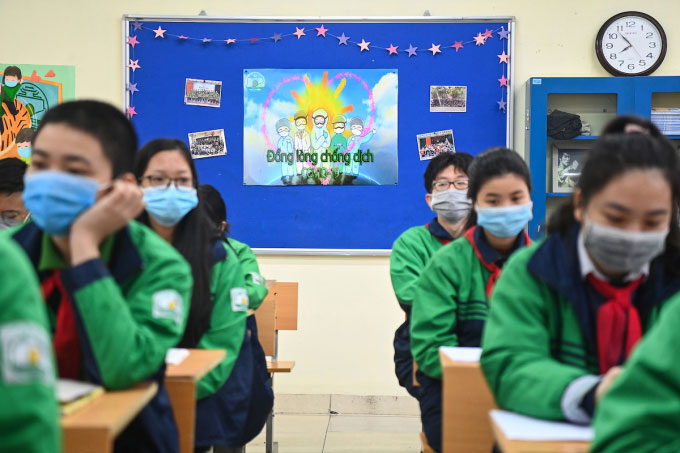Parents and teachers guide children on how to wear masks, wash hands regularly, disinfect objects, ensure social distancing, and maintain well-ventilated classrooms.
Guide to Preventing Covid-19 Infection for Children Returning to School
Master Kiều Xuân Thy (Ho Chi Minh City University of Medicine and Pharmacy, Campus 3) shares that preventing the spread of Covid-19 for children returning to school is a top concern for parents. Many parents worry about the risk of infection because school-aged children may not fully understand the principles of self-protection.
Below are some preventive recommendations against Covid-19 from the Ho Chi Minh City Center for Disease Control and the Mayo Clinic Health System in the United States:
Wearing Masks
For preschool children, parents should wear masks for themselves and their children when taking them to and from school or when using public transportation. Elementary and middle school students should wear masks when arriving at school, in the classroom (recommended), when leaving, and when necessary. Wearing masks is particularly important in places where social distancing is hard to maintain, such as on buses and trains.
Prepare multiple clean masks as backups. Parents should instruct children to put masks in a clean, zippered bag when not in use, or label their masks to avoid confusion with others.

Students of Nguyen Tri Phuong Secondary School in Hanoi return to school on February 8. (Photo: Giang Huy).
Parents should teach children how to properly wear and remove masks, avoiding touching the outer fabric. Remind them to wash their hands before and after touching the mask, not to share or exchange masks with others, and discuss the importance of wearing masks.
Note that masks should not be worn by children under two years old or by those with respiratory issues.
Cleaning and Disinfecting
Schools need to disinfect surfaces before and after students arrive and leave; ensure classrooms are well-ventilated, preferably with natural airflow; and provide basic knowledge about the disease to enhance students’ awareness.
Cleaning and disinfecting frequently touched surfaces can help reduce the risk of disease transmission. Pay attention to areas that are often touched, such as doorknobs, tabletops, faucets, and handrails.
Vaccination
The Ministry of Health has approved the Comirnaty vaccine from Pfizer-BioNTech and Spikevax from Moderna for children aged 12-17, which includes students from grades 7 to 12.
Studies show that the Pfizer-BioNTech vaccine is 100% effective in preventing Covid-19 in children aged 12 to 15, and 91% effective in preventing severe illness in individuals aged 16 and older. Vaccination against Covid-19 can help keep children safer when attending school and participating in recreational activities.
Implementing Social Distancing
Remind children to limit gatherings. One-way pathways can be created in school hallways, and additional outdoor space can be used for children to take breaks and eat. Air conditioning should not be used; instead, open windows and turn on fans.
Reduce the number of children on buses, keep classrooms well-ventilated, and arrange desks to face the same direction. Use acrylic dividers between dining tables or areas where close contact occurs. Children can be divided into smaller groups to minimize interaction between groups unless necessary.
Hand Hygiene
Be patient in guiding preschool children to wash their hands with soap or hand sanitizer before going to school, after returning home, when their hands are dirty, and as needed.
Older children should wash their hands regularly with soap or hand sanitizer before going to school, after recess, when returning home, when their hands are dirty, and as needed. They should cover their mouths and noses with tissues or their elbows when coughing or sneezing. They should not spit, litter, or dispose of masks carelessly. Personal items like cups, water bottles, and towels should not be shared. Avoid touching the eyes, nose, or mouth with hands.
Staying Home if Sick
Do not send children to school if parents are in home quarantine or showing symptoms such as fever, cough, or difficulty breathing. Measure the child’s temperature and monitor their health at home; if they show symptoms of cough, fever, or difficulty breathing, proactively allow them to stay home and inform the school and health authorities.
Nutrition
According to Dr. Thy, parents should provide adequate nutrition and maintain light exercise for children to enhance their immunity. A diet rich in vitamin C, fiber, protein, and sufficient hydration is essential. Ensure meals are on time, children get enough sleep, and maintain proper hygiene habits both at school and home to ensure optimal health for effective learning during the new normal.
“In cases where children eat at school, the administration must ensure that staff maintain continuous mask-wearing (except during meal times), and wash hands frequently before and after working. Ensure a well-ventilated space and maintain distance between children during meal times,” Dr. Thy recommends.



















































